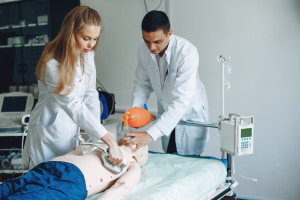Early detection of cardiac arrest is a critical factor in increasing a patient’s chance of survival, as it enables the immediate initiation of high-quality cardiopulmonary resuscitation (CPR). Studies show that with prompt and effective CPR, the likelihood of survival can increase twofold, underscoring the lifesaving impact of rapid action. In this course, you will gain valuable skills in recognizing clinical signs of cardiac arrest and responding without delay. You will learn to identify early indicators such as irregular breathing, loss of consciousness, and absence of a pulse, all essential signs that can help healthcare providers intervene effectively.
These early assessment skills are invaluable in high-stakes scenarios, where every second counts. As you progress, you’ll delve into the core principles of basic life support, emphasizing the crucial role that high-quality CPR plays in stabilizing cardiac arrest patients. Additionally, the course covers advanced airway management techniques that maximize oxygen delivery, such as endotracheal intubation and the use of supraglottic airway devices, as well as the fundamentals of bag-mask ventilation and various strategies for optimal ventilation during cardiac arrest. Together, these methods provide a comprehensive skill set for managing life-threatening situations and are critical competencies for any healthcare professional. The course also introduces Advanced Cardiopulmonary Life Support (ACLS), where emergency cardiovascular medications play an essential role in patient recovery. Medications like adrenaline, amiodarone, and atropine, when used promptly and correctly, can improve outcomes by supporting the heart's function, stabilizing the patient, and preventing further complications. ACLS techniques can dramatically impact a patient’s prognosis, but a thorough understanding of dosages, potential side effects, and specific indications is necessary to apply them safely and effectively. As a course participant, you’ll study the practical uses and pharmacological effects of key emergency medications, gaining insights into how and when to administer these drugs. This section of the course provides detailed guidance on the precise use of medications during cardiac arrest and other cardiovascular emergencies, enhancing your ability to make informed, life-saving decisions in time-sensitive scenarios. Understanding these medications is a crucial aspect of emergency care, equipping you to improve patient outcomes while minimizing the risk of adverse effects. Central to ACLS is the ability to interpret cardiac rhythms accurately, as this skill is foundational to delivering appropriate treatment in cardiac emergencies. Cardiac rhythm interpretation allows healthcare providers to assess the heart’s electrical activity and diagnose specific arrhythmias or abnormalities, which inform the choice of intervention. In this course, you’ll master the fundamentals of cardiac rhythm interpretation and gain practical experience reading electrocardiograms (ECGs) to recognize common and life-threatening patterns. The course also covers vascular access techniques, essential for delivering life-saving medications and fluids quickly and effectively. Mastery of these techniques will enable you to provide timely and precise care to patients in critical situations. By the end of this section, you will be equipped with the skills and confidence to handle complex cardiac cases, applying best practices in both medication management and rhythm interpretation to optimize patient outcomes.
This Advanced Life Support course is meticulously designed to provide healthcare professionals with the knowledge and practical skills needed to manage cardiac emergencies, including cardiac arrest, with competence and confidence. Covering a comprehensive range of topics, from basic CPR to advanced interventions, this course lays the groundwork for earning your ALS certification and is ideal for professionals aiming to deepen their understanding of Advanced Life Support. Whether you’re an EMT, nurse, or physician, this course will enhance your expertise in managing critical cardiac events, empowering you to make a significant impact on patient outcomes in high-pressure environments. Enroll today to take the next step in your professional development and to acquire life-saving skills that will benefit your patients and elevate your career in healthcare.
What You Will Learn In This Free Course
View All Learning Outcomes View Less All Alison courses are free to enrol, study, and complete. To successfully complete this Certificate course and become an Alison Graduate, you need to achieve 80% or higher in each course assessment.
Once you have completed this Certificate course, you have the option to acquire an official Certificate, which is a great way to share your achievement with the world.
Your Alison certificate is:
- Ideal for sharing with potential employers.
- Great for your CV, professional social media profiles, and job applications.
- An indication of your commitment to continuously learn, upskill, and achieve high results.
- An incentive for you to continue empowering yourself through lifelong learning.
Alison offers 2 types of Certificate for completed Certificate courses:
- Digital Certificate: a downloadable Certificate in PDF format immediately available to you when you complete your purchase.
- Physical Certificate: a physical version of your officially branded and security-marked Certificate
All Certificate are available to purchase through the Alison Shop. For more information on purchasing Alison Certificate, please visit our FAQs. If you decide not to purchase your Alison Certificate, you can still demonstrate your achievement by sharing your Learner Record or Learner Achievement Verification, both of which are accessible from your Account Settings.












 Avg. Hours
Avg. Hours  Contains Video
Contains Video  CPD Accredited
CPD Accredited 
 Total XP:
Total XP: 
 Knowledge & Skills You Will Learn
Knowledge & Skills You Will Learn 







